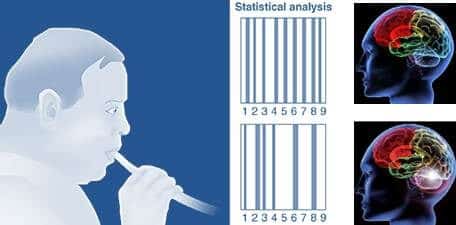Prof. Hosem Haik and Prof. Ariel Miller identified volatile organic components that were found to be linked to multiple sclerosis, and are found in the oral cavity (exhaled air).

Technion scientists report progress - and successful tests in humans - of a sensor array capable of diagnosing multiple sclerosis based on oral speech - progress they describe as a breakthrough in the long-standing search for a quick, cheap and non-invasive test for multiple sclerosis, which is the most common neurological disease in "young adults" ". Their report appears in the scientific journal ACS Chemical Neuroscience
Professor Hussam Haik from the Technion Faculty of Chemical Engineering and the Russell-Berry Nanotechnology Research Institute, Professor Ariel Miller from the Technion Faculty of Medicine and Carmel Hospital and their colleagues report that doctors currently diagnose multiple sclerosis based on the typical symptoms, including: visual disturbances, muscle weakness, severe fatigue, problems Coordination, feelings of "falling asleep", sensory disturbances. Confirmation of the diagnosis and decision-making regarding the therapeutic method are done based on the brain imaging in a magnetic resonance imaging (MRI) device. Another helpful diagnostic tool is a lumbar puncture which aims to check the cerebrospinal fluid and the spinal cord.
But MRIs are expensive tests, and the puncture is invasive. In order to overcome these obstacles, the researchers identified volatile organic components that were found to be linked to multiple sclerosis, and are found in the oral cavity (exhalation air). Based on their initial findings, the researchers developed a set of new nanometer sensors (a nanometer is a measure smaller than the diameter of a hair by about 100,000 times) with the power of which it may be possible to diagnose multiple sclerosis in the future based on an analysis of the chemical components that appear in the oral cavity of the sclerosis patients.
Using the dedicated sensors, the researchers performed a preliminary clinical study on 34 patients and 17 healthy volunteers, and discovered that a test using sensors is as accurate as the lumbar acupuncture findings, but without the pain and risk associated with the injection. "The results presented here open new paths in the development of fast, non-invasive and inexpensive medical diagnostic tools for the diagnosis of chronic neurological diseases," said the Technion researchers. "This is a very preliminary study and the continuation of the study is focused on establishing the findings, and their significance regarding the possibility of future use as a basis for distinguishing between different stages of the disease, for predicting attacks and early identification of the patients who are expected to respond optimally to drug treatments."
The Technion emphasizes that the research is only at its beginning and that there is a long way to go until the process becomes a commercial test kit that will be used by health services around the world for diagnosis.

4 תגובות
Strange indeed
For many years we have been hearing about the great promise of the electronic nose. So what is really going on here?
If indeed the results of the "electronic nose" are indeed so good in identifying multiple sclerosis, and the same is said about identifying different types of cancer, I am very surprised that the researchers say that the road to commercialization of the device is still long.
The reasons for my surprise are as follows:
1. From a technological point of view, they proved that the device works,
2. Regarding performing additional tests on patients, double imaging studies and so on - apparently there is no problem since this is a test for which no special medical certificates, medical boards, terminal patients, etc. are required.
3. There is no shortage of people on whom the diagnosis can be made: in Israel and abroad.
4. The results of the test are fast or immediate (at least that's how it's advertised), there's no need to do months of analysis to understand the results, etc., etc.
5. Funding for such a revolutionary device will not be problematic - investment funds in the biomed field will line up and are probably already lining up now.
So what exactly is going on here???